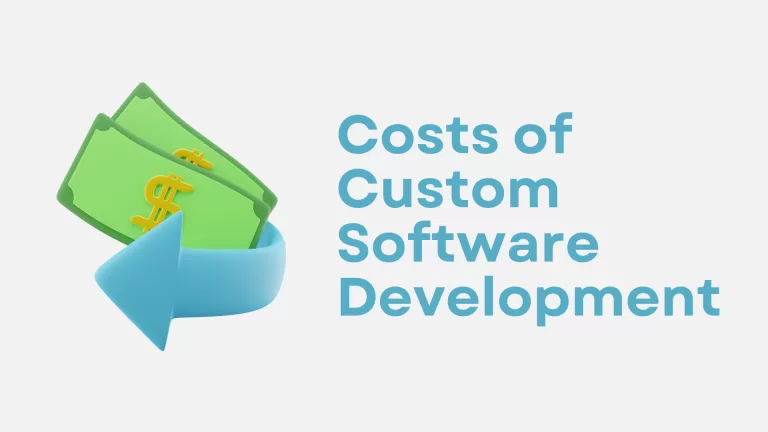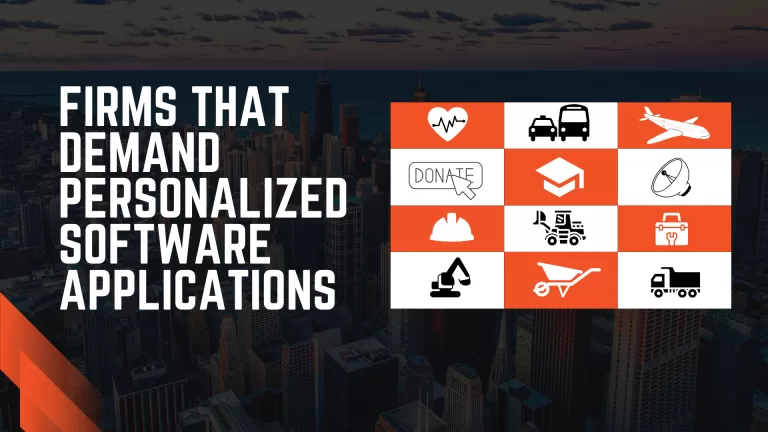Why businesses opt for custom software development?
Share post on
Table of Contents
Custom Software Solutions
The process of developing custom software involves several key stages:
- Requirement Gathering: Understanding the specific needs and goals of the client. This involves detailed discussions and analysis to ensure the final product aligns with the client’s vision.
- Planning: Creating a comprehensive project plan, which includes defining the scope, setting timelines, and determining resources required for the project.
- Design: Developing the software architecture and design specifications. This includes creating wireframes and prototypes to visualize the end product.
- Development: Writing the code and building the software. This phase involves front-end and back-end development to ensure all functionalities are integrated.
- Testing: Conducting thorough testing to identify and fix bugs or issues. This ensures the software functions smoothly and meets all requirements.
- Deployment: Releasing the software for use. This includes installing and configuring the software in the client’s environment.
- Maintenance: Providing ongoing support and updates to ensure the software remains functional and up-to-date. This includes addressing any issues that arise and implementing new features as needed.
Understanding the Costs of Custom Software Development

The cost of custom software development can vary based on several factors:
- Complexity: More complex software solutions require more time and resources to develop, which increases costs.
- Features: The number and intricacy of features directly impact the development cost.
- Development Time: Longer projects incur higher costs due to extended labor and resource utilization.
- Technology Stack: The choice of programming languages, frameworks, and tools can influence the cost.
- Team Size: Larger teams often result in higher costs, although they may accelerate the development process.
Categories of Custom Software Development Services
Custom software development encompasses various types of services, including:
- Web Applications: These are accessible through web browsers and are platform-independent.
- Mobile Applications: Designed for smartphones and tablets, these apps cater to on-the-go usage.
- Desktop Applications: Installed and run on personal computers, providing robust functionality.
- Embedded Systems: Software designed for specific hardware, such as IoT devices and appliances.
- Enterprise Software: Large-scale solutions like CRM, ERP, and SCM systems that support business operations.
Custom Software vs. Off-the-Shelf Solutions

Custom Software:
- Customized to meet specific requirements.
- Offers flexibility and scalability.
- Provides a competitive advantage.
- Requires a higher initial investment.
- Development takes longer.
Off-the-Shelf Software:
- Ready to use immediately.
- Lower initial cost.
- Generic features may not fully meet specific needs.
- Limited customization options.
- Easier to deploy and use.
Advantages of Custom Software Development
- Personalization: Custom software is designed to meet the unique needs and preferences of the client.
- Scalability: Custom solutions can be scaled to accommodate growth and changing requirements.
- Integration: Custom software can be integrated seamlessly with existing systems and processes.
- Security: Enhanced security features protect sensitive data from breaches and cyber threats.
- Support and Maintenance: Ongoing support and maintenance ensure the software remains functional and up-to-date.
Challenges in Custom Software Development
- Higher Cost: Custom software development usually requires a higher initial investment compared to off-the-shelf solutions.
- Time-Consuming: The development process can take longer, requiring more time for planning, development, and testing.
- Risk: There is a risk of project failure if not managed properly, particularly in terms of meeting deadlines and budget constraints.
- Dependency: Clients may become dependent on the development team for updates, support, and maintenance.
Custom Software Development Services Aishco Solutions Offers
Aishco Solution provides a range of custom software development services designed to meet the specific needs of their clients. Their services include:
- Custom Web Application Development: Creating web-based applications customized to the client’s requirements.
- Mobile App Development: Designing and building mobile applications for various platforms, including iOS and Android.
- Enterprise Software Development: Developing robust software solutions for business management, including CRM, ERP, and SCM systems.
- Software Integration Services: Ensuring seamless integration of new software with existing systems and processes.
- Support and Maintenance: Providing ongoing support and maintenance to ensure the software remains functional and up-to-date.
- Digital Marketing Services: Offering comprehensive digital marketing strategies to help businesses improve their online presence and reach a larger audience.
- Staff Augmentation: Providing skilled professionals to augment the client’s in-house team and fill gaps in expertise or capacity.
- Business Consulting Services: Offering expert advice and strategies to help businesses optimize their operations and achieve their goals.
- Technology Stack Expertise: Proficient in a wide range of technologies including Next.js, Vue.js, Angular, Flutter, React, Node.js, Adonis.js, .NET Core, Flutter, and more.
Who Are Custom Software Developers?
Reasons to Outsource Custom Software Development

Outsourcing custom software development projects can offer several advantages:
- Cost Savings: Outsourcing can reduce costs by leveraging lower labor rates in other regions.
- Access to Expertise: Outsourcing provides access to skilled professionals with specialized expertise.
- Focus on Core Business: Outsourcing allows businesses to focus on their core competencies while the development team handles the software project.
- Faster Time to Market: Outsourcing can accelerate the development process and reduce time to market.
- Scalability: Outsourcing offers the flexibility to scale the development team up or down as needed.
Popular Methodologies for Custom Software Development
Agile
Agile methodologies, like Scrum and Kanban, emphasize collaboration, flexibility, and customer feedback. They focus on incremental delivery and continuous improvement.
Waterfall
Waterfall is a linear and sequential approach where each phase must be completed before moving on to the next. It’s structured but less flexible than Agile.
DevOps
DevOps combines software development and IT operations to enhance collaboration and efficiency. It emphasizes automation, continuous integration, and continuous delivery.
What is DevOps: Explore DevOps
Lean
Lean focuses on minimizing waste and maximizing value, aiming to deliver customer value quickly and efficiently.
Types of Firms That Demand Personalized Software Applications

- Healthcare Providers: Hospitals, clinics, and other healthcare organizations need customized software to manage patient records, facilitate telemedicine, streamline administrative processes, and improve patient care through data analytics.
- E-commerce and Retail: Online retailers and brick-and-mortar stores demand personalized software to manage inventory, optimize supply chain operations, enhance customer experiences, and analyze shopping trends for better decision-making.
- Manufacturing Firms: Manufacturing companies benefit from bespoke software to monitor and manage production processes, improve supply chain efficiency, ensure quality control, and integrate with other systems for seamless operations.
- Educational Institutions: Schools, colleges, and universities require customized software to manage student information, facilitate online learning, track academic progress, and enhance communication between students, teachers, and parents.
- Travel and Hospitality: Travel agencies, hotels, and airlines use personalized software to manage bookings, enhance customer service, optimize operations, and provide personalized travel experiences to their customers.
- Real Estate: Real estate firms leverage custom software to manage property listings, streamline transaction processes, facilitate communication between buyers and sellers, and provide data-driven insights for better decision-making.
- Telecommunications: Telecom companies require specialized software to manage networks, monitor service quality, handle customer data, and provide personalized communication solutions to their clients.
- Logistics and Transportation: Firms in this sector benefit from customized software to manage fleet operations, optimize delivery routes, track shipments, and ensure timely delivery of goods.
- Nonprofits and NGOs: These organizations often need customized software to manage donor information, track fundraising activities, streamline operations, and measure the impact of their programs.
Frequently Asked Questions
What is custom software development?
Custom software development involves creating software that is customized to meet the specific needs of an individual client or business, unlike off-the-shelf software that is designed for a broad audience.
How long does it take to develop custom software?
The development time for custom software can vary depending on the complexity and scope of the project. It typically ranges from several months to over a year.
What are the benefits of custom software over off-the-shelf solutions?
Custom software offers personalization, scalability, integration with existing systems, enhanced security, and ongoing support and maintenance customized to the client’s needs.
How much does custom software development cost?
The cost of custom software development depends on factors such as complexity, features, development time, technology stack, and team size. It generally requires a higher initial investment compared to off-the-shelf solutions.
Can custom software be integrated with existing systems?
Yes, custom software can be designed to integrate seamlessly with existing systems and processes, ensuring compatibility and efficiency.
Why should businesses outsource custom software development?
Outsourcing can provide cost savings, access to specialized expertise, allow businesses to focus on core activities, accelerate time to market, and offer scalability in the development team.
Final Thoughts
Custom software development is a powerful way to create customized solutions that meet the unique needs of businesses and individuals. While it requires a higher initial investment and takes longer to develop, the benefits of personalization, scalability, integration, security, and support make it a worthwhile investment for many organizations. By understanding the process, costs, and methodologies involved, as well as the potential benefits and challenges, businesses can make informed decisions about their software development projects.
Our Services
Our company specializes in custom web applications, providing solutions using the latest technologies. It develops innovative mobile apps for both iOS and Android platforms to engage users effectively. Expert business consulting services are available to enhance operations through modern technologies.In e-commerce, the company builds platforms to improve customer experience and boost online sales. Additionally, staff augmentation services offer skilled developers to support projects. Our digital marketing strategies focus on enhancing online presence and reaching target audiences across various applications.
Share post on




